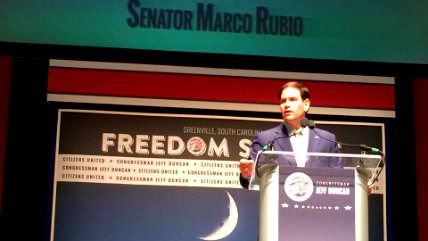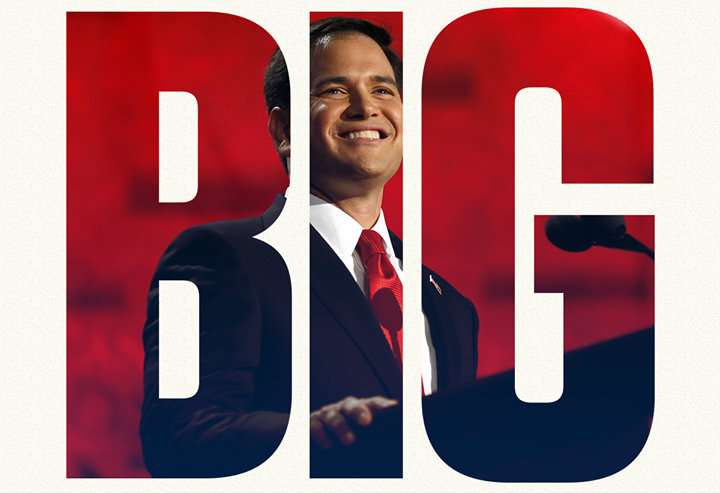Marco Rubio's Foreign Policy: Reckless, Reactionary Big-Gov Love
Hey Rubio: If government can't manage health care, how can it manage regime changes in foreign societies?

Republican presidential aspirant and U.S. Sen. Marco Rubio gave a major foreign-policy speech recently, and the best that can be said is that he did not claim to favor small government and free markets. What he wants in a foreign policy couldn't possibly be reconciled with any desire to limit government power. Rubio is for big government no matter what he might say on the campaign trail.
He acknowledged this when he said, correctly, "Foreign policy is domestic policy."
Rubio set out a doctrine with three pillars, none of which which should comfort anyone who understands, as the great libertarian writer Albert Jay Nock noted, that political power displaces social power. The three pillars are: "American Strength," "protection of the American economy," and "moral clarity regarding America's core values." All three display a hubris typical of a big-government advocate, including those of the conservative variety.
Regarding strength, Rubio wants you to believe that America's ability and eagerness to project global power prevents war, while "weakness" promotes it: "the world is safest when America is at its strongest."
Where has he been this century? Does he not know that U.S. power knocked out Shiite Iran's chief regional adversary (Saddam Hussein's Sunni-dominated regime in Iraq), in turn giving rise to a more-virulent form of al-Qaeda (ISIS), which controls large parts of Iraq and Syria while extending its influence to Africa and elsewhere? Contrary to Rubio, violent disorder has been the direct outcome of George W. Bush's post-9/11 invasions of Afghanistan and Iraq, and Barack Obama's 2011 declaration of open season on Bashar al-Assad in Syria and bombing of Libya. [Al-Qaeda's 9/11 attacks of course followed decades of U.S. intervention on behalf of, among others, Saudi Arabia, Egypt, and Israel.]

It's not that the U.S. government should have sided with Saddam, Assad, and Libya's Muammar Gaddafi, all secular rulers. Rather, the point is that the exercise of American power is most likely to muck things up. If government can't manage health care (as Rubio believes), how can it manage regime changes in foreign societies? Why don't conservatives ever ask themselves this?
Rubio thinks Obama, who's hardly a dove, hasn't war-mongered enough. The Republican wants even more confrontation—with Russia, China, Cuba, and North Korea. What he calls strength is just recklessness. Rubio's speech demonstrates his unfitness for office (assuming anyone is fit for office).
He says he wants to spread freedom and other values, but he must realize that what American drones, bombers, and special ops spread are death and social upheaval. Again, where has Rubio been?
"America did not intend to become the world's indispensable power," Rubio said, adding, "America is the first power in history motivated by a desire to expand freedom rather than its own territory." Here he adds historical demagoguery to political recklessness. From the start, many American rulers, who embraced empire, intended to make America the continental, hemispheric, and even world hegemon. War was an option, and no one—not the Indians, Spanish, English, French, or Russians—would thwart destiny. Rubio's glorification of American "strength" is reactionary.
His second pillar, protection of the American economy, also shows his attraction to government power. Although he invokes "free trade," Rubio embraces "trade's role as a tool of statecraft that can bolster our relationships with partners and create millions of jobs." So much for the free market. Again, Rubio is a reactionary. Most American presidents believed that trade was not a matter for free enterprise but a government program designed for political objectives, including the benefit of special interests. [The military-industrial complex must be licking its chops.]
Rubio says he will promote, as his third pillar, moral clarity regarding America's core values. Are those the same core values promoted by America's embrace of dictators and monarchs in the Middle East (and elsewhere) and Israel's decades-long oppression of the Palestinians, which Rubio supports? Note well that Rubio's values do not include privacy. He wants to protect the NSA's PATRIOT Act bulk-data-collection program.
Rubio seeks to "restore America's status as a nation that shapes global events rather than one that is shaped by them." We can't afford another ruler with such hubris.
This piece originally appeared at Richman's "Free Association" blog.


Show Comments (41)